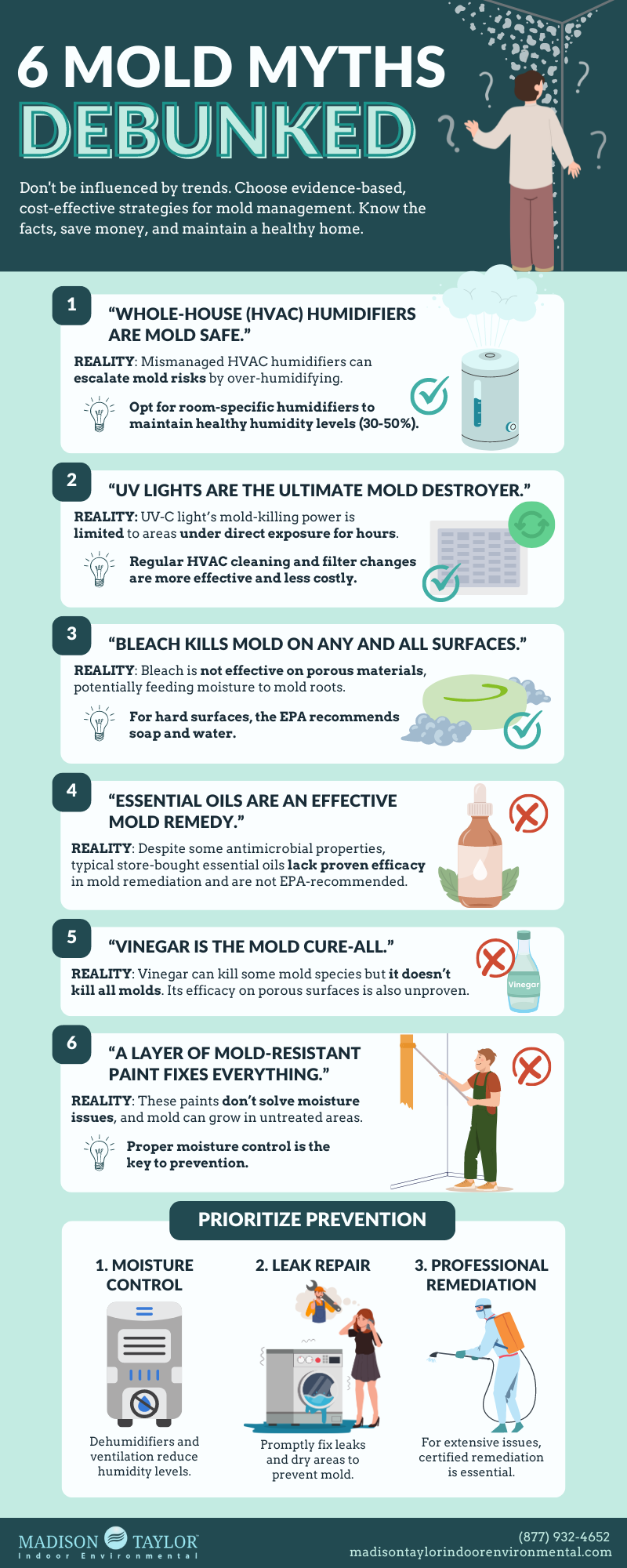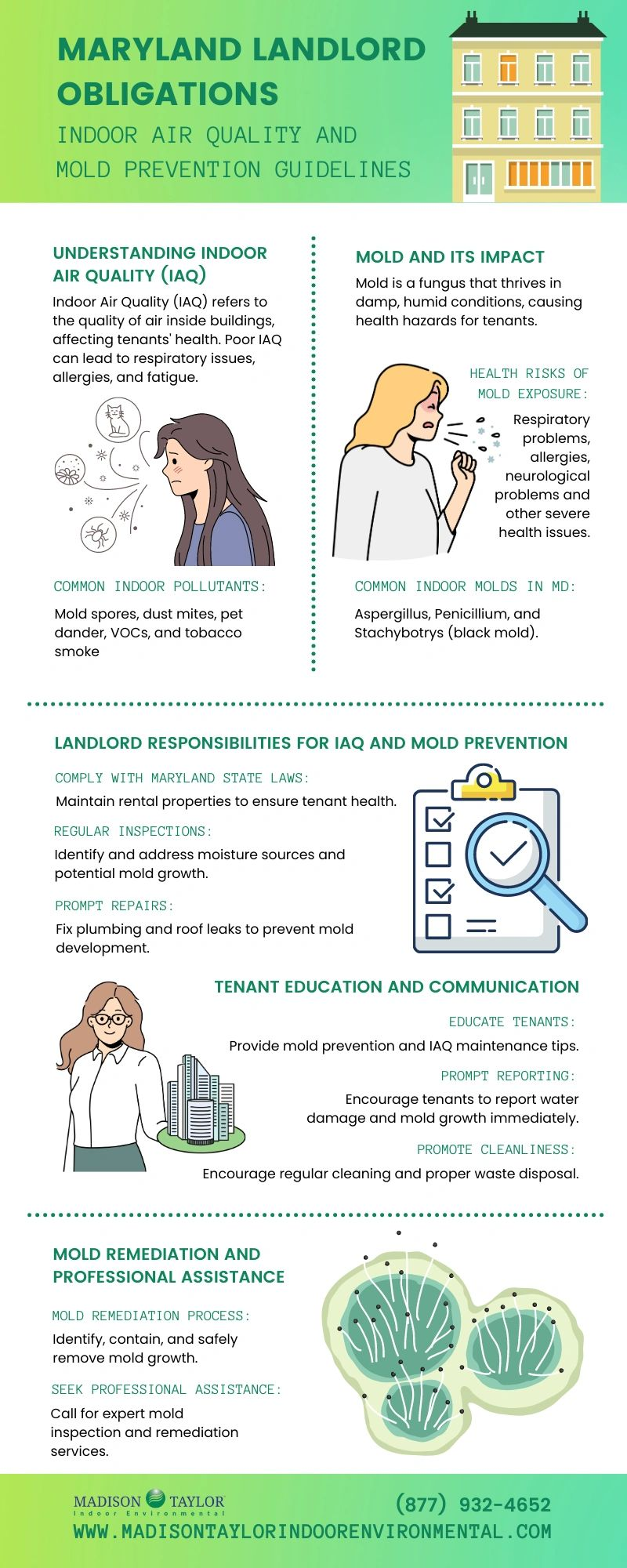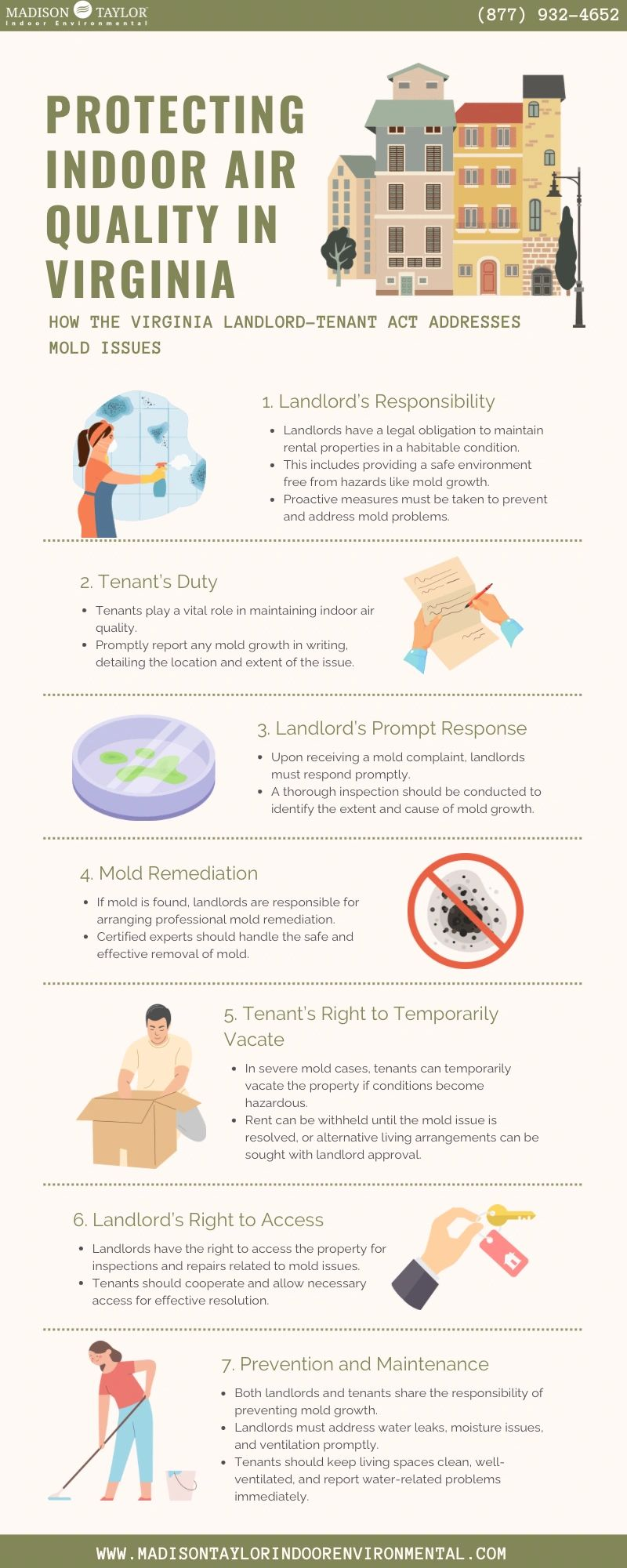Deinfluencing Mold Removal: Truths Behind the Misconceptions
In an era where social media influencers often persuade us to buy products we barely need, a countermovement called "deinfluencing" has emerged. It encourages us to rethink our consumption habits, especially regarding subjects with potential health impacts – like mold removal. Mold, a common air quality concern for all types of buildings, has the potential to create various health and structural risks, especially when the mold source is left unchecked and untreated. However, not all the popular advice and “miracle cure” products circulating around social media are effective or even necessary.
Why Mold Removal Matters
Mold can cause significant health issues ranging from allergies and respiratory problems to more serious infections, especially in immunocompromised individuals. It can also damage building materials, leading to costly repairs. However, not all molds are equally harmful, and the approach to mold removal should be informed and proportionate to the risk.
Deinfluencing Mold Removal
The drive to purchase the latest gadgets or chemicals to tackle mold can often lead to unnecessary spending without addressing the root cause of mold growth: excessive moisture. Here, we delve deeper into common misconceptions about mold removal tools and techniques, focusing on the effectiveness and necessity of such solutions.
Humidifiers in HVAC Systems
Because controlling indoor humidity is crucial for preventing mold, the misuse of humidifiers can contribute massively to mold growth. The goal is to maintain relative humidity levels between 30-50%. Overuse of humidifiers, especially in already damp environments, can create ideal conditions for mold – so ditch the humidifying system built into your HVAC. Instead of relying on a whole house humidifier, consider integrating room humidifiers in areas where extra moisture is needed.
UV Lights in HVAC Systems
UV light systems are marketed as a solution for killing mold and bacteria in HVAC systems. While UV-C light can indeed neutralize certain microbes, its effectiveness against mold is limited to surfaces directly exposed to the light. Mold within ductwork or areas not reached by UV light continues to pose a risk. Moreover, the installation and maintenance of these systems can be costly. Before investing in UV light technology, ensure your HVAC system is regularly cleaned and filters are changed, which are more effective practices for controlling mold.
Expensive Mold Removal Products and Services
In the quest to combat mold, numerous DIY solutions and products have gained popularity, often without scientific backing and flooding the market with high-priced mold removal products claiming to be the miracle fix. With misinformative advertising on every corner, understanding which methods are ineffective or potentially harmful is crucial for homeowners looking to make informed decisions.
- Bleach for Mold on Porous Surfaces: A common misconception is that bleach can effectively kill mold on porous surfaces like wood or drywall. However, bleach can only kill mold on non-porous surfaces. On porous materials, it may remove the color, making the mold invisible without reaching the root of the problem. Moreover, the excessive moisture from bleach can contribute to further mold growth. The U.S. Environmental Protection Agency (EPA) suggests that for mold cleanup on hard surfaces, soap and water or a mild detergent is often sufficient.
- Essential Oils as Mold Killers: Some advocate the use of essential oils for mold remediation due to their antimicrobial properties. While certain oils, like tea tree oil, have been shown to have some antimicrobial effects, the effectiveness of the essential oils (particularly the ones you would typically buy in a store or online) in mold remediation is not supported by sufficient scientific research. The EPA does not list such “over-the-counter” essential oils as recommended treatments for mold cleanup.
- Vinegar for All Mold Types: Vinegar is often touted as an eco-friendly solution to mold problems. While it can be effective against some types of mold on non-porous surfaces, its effectiveness varies, and it's not a universal solution for all mold types or surfaces. Research suggests that vinegar can kill up to 82% of mold species, but there's no clear evidence on its efficacy against all types, especially on porous materials.
- Commercial Mold-Resistant Paints as a Cure-All: Mold-resistant paints may prevent mold growth on the painted surfaces, but they do not address the underlying moisture issues that cause mold. Without solving the root problem, mold can continue to grow on other surfaces or behind walls. Effective moisture control is essential for long-term mold prevention.
Emphasizing Prevention over Cure
Deinfluencing in the context of mold removal also means prioritizing prevention. Simple lifestyle and home maintenance practices can significantly reduce the risk of mold growth:
- Moisture Control: Use dehumidifiers and ensure proper ventilation to keep indoor humidity below 60%. Pay special attention to and use exhaust fans in high-moisture areas such as bathrooms, kitchens, and basements.
- Identify and Repair Leaks: Water intrusion is a primary cause of mold. Fix leaks promptly to prevent mold growth. Clean and dry wet areas within 24-48 hours to prevent mold growth.
- Professional Assessment: For large or hidden mold issues, hiring a certified professional ensures thorough removal and prevents recurrence.
By adopting a prevention-focused mindset, homeowners can mitigate mold issues without resorting to costly or unnecessary products and interventions.
While DIY remedies and commercial products can play a role in managing mold, understanding their limitations and the science behind effective mold removal is crucial. Deinfluencing in this context means moving away from trendy solutions and towards evidence-based, practical approaches to mold remediation and prevention. Focusing on moisture control, using appropriate cleaning methods for different surfaces, and consulting professionals when necessary are key strategies for effective mold management.
References:
- U.S. Environmental Protection Agency (EPA). "A Brief Guide to Mold, Moisture, and Your Home." EPA.gov.
- Centers for Disease Control and Prevention (CDC). "Basic Facts about Mold and Dampness." CDC.gov.
- Institute of Inspection Cleaning and Restoration Certification (IICRC). "S520 Standard for Professional Mold Remediation."
- Journal of Environmental and Public Health: Discusses the antimicrobial properties of essential oils but highlights the lack of specific research on their effectiveness against mold in real-world scenarios.
- Indoor Air Quality Association (IAQA): Offers insights into mold prevention and the limitations of mold-resistant products in addressing moisture problems.




